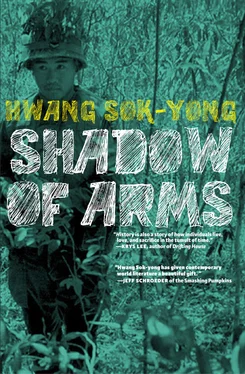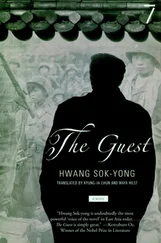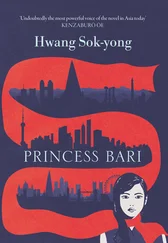“No, just flash the emergency lights.”
The Jeep drove at full throttle, showering faint glints of colored light on the sunlit streets. Other vehicles either stopped or waited for them to pass. As they were about to turn past the smokestacks onto the bridge, a long column of dusty military vehicles came into sight from the left.
“What shall I do, sir?” the driver quickly asked.
“Just cut through the convoy.”
If they waited for the parade to pass, the general would have time to get up and go somewhere and the day would be wasted. They saw the lead Jeep in the US Army convoy stop suddenly. An officer got out and pointed at them, shouting something indiscernible. Major Pham Quyen waved and passed by them.
“What a nutcase.”
The major might have seemed naive, even stupid. But Pham Quyen was known throughout the second ARVN headquarters as a master strategist. He had graduated from a university in Saigon and from the Army Military Academy in Na Trang. He was fluent in both French and English. Even as a cadet he had stood out from his peers. He’d gotten his reputation at school after an incident: he had supported the opinion of an American advisor, a lieutenant colonel in the US Army.
The advisor was explaining textbook passages on usage of ponchos during the rainy season and on the importance of mosquito repellant for prevention of malaria. One of the brighter students challenged the text:
“Rub-on mosquito repellant doesn’t work here. In the central region, the rainy season runs from September to March and it’s not constant rainfall; it rains and clears up several times a day. Rub-on repellant just gets washed off in the heavy showers, and then as soon as the rain stops, vicious jungle mosquitoes come out and attack. So, even if it may work in America, that kind of repellant is useless here. Instead, malaria preventatives are needed. Also, the standard-issue rain ponchos aren’t good for jungle ambushes. The sound of raindrops on a poncho is louder than drops falling on the ground. The enemy would hear us coming. Instead of a poncho, we should use thin vinyl capes.”
This raingear was exactly what the Viet Cong used. The advisor was in a difficult position. He had come to teach operational tactics, but if his instructions were deemed inept, then America would have a hard time training these Vietnamese and marshaling them in accordance with the American doctrines of warfare. But just then Pham Quyen raised his hand and stood up to speak.
“The counterarguments raised lack objectivity for the situation here in Vietnam. Our combat consists of searches by day and ambushes by night. The only thing moving at night is the enemy. As for firearms and artillery, we have the best in the world. Given our superior firepower, such discussions on the ideal raincoat are pointless. If the enemy discovers us first, we can take them out with an artillery barrage or air support before they slip away. The same goes for the mosquito repellant — if it washes away, we’ll just rub it on again. We can always make more.”
The reasoning was so straightforward and confident that it made the doubts raised by the other cadet’s incisive questioning sound defeatist. The brilliant young officer attracted the attention of the advisor, who quickly appointed Pham Quyen to the liaison staff. He was marked as a Vietnamese who thought like an American, and that was exactly what the US Army liked to see. Promotions came rapidly and soon he was recommended to General Liam. Whatever the general wanted, Quyen always anticipated it in advance.
Resistance was strongest and most concentrated in the Central Highlands, and so it was a major focus of US Army concern. They had unlimited support for their pacification and resettlement campaigns there, and the entire command structure for managing and implementing these projects fell under the jurisdiction of General Liam as the military governor of Quang Nam Province. During the planning process, the US Agency for International Development only had an economic veto power. As the chief secretary to the governor, Major Pham Quyen was the man who took care of everything. But all the general did was sign off on documents and listen to reports on the results of specific initiatives. He placed total trust in Pham Quyen.
The Jeep was entering Bai Bang. The area was lush with vegetation: shrubs, broadleaved trees, tropical flowers. The long road went out a finger of land toward a steep cluster of mountains that jutted up from the sea like a raised fist. With the road gate closed, there was no entry to or exit from the compound. The Jeep passed through the main gate to the US Naval Headquarters without being stopped and searched and turned right into a narrow alley.
“Go slow,” ordered Pham Quyen.
There was stone breakwall about twenty-five or thirty feet high to the right of the road and the waves that broke against it shot white foam into the air. The asphalt was dirty in some places. Barbed wire had been strung from the upper edge of the breakwall in certain spots. A searchlight from a high tower shone intermittently. The other side was completely different: fragrant flowers, birds singing and flitting about. There was not a single monkey to be seen anywhere on Monkey Mountain.
Then the road curved landward and went up a steep grade. On the sunny hill the trees grew sparse, and then all of the sudden they were gone entirely. The forest had been bulldozed and grass planted. The road wound past the new golf course. On the beach side there were three watchtowers with searchlights and machine guns at the top of their ladders. A guard sat idly in each tower. The Jeep did not turn into driveway but went on to the parking lot some ways away.
A solid-looking two-story brick building on the edge of the slope was the general’s villa. The windows were all tinted dark blue. Behind the house was a tiled swimming pool. Farther down the slope on the right were the guards’ quarters and a large storehouse, and behind that stood a tennis court encircled by a white fence covered in wire mesh.
The first time Pham Quyen had visited Bai Bang he was awestruck. He had even taken his boots off so he wouldn’t get dirt on the carpet. But the general traveled to Saigon for several days for a meeting with the president at Independence Palace soon after that, and then Quyen became very comfortable in the villa. He even made it his own, bringing a woman with him and spending a three-day vacation there. He popped the general’s champagne, and even used the general’s bed. The Chinese cook, Chap, dressed up in the general’s robe with its embroidered dragon in Qing-dynasty style. Quyen had spent about two thousand dollars to use the villa during his sojourn. The money had, of course, gone to buy the complicity of the cook, the butler, and the guards. Whenever Liam went to Saigon, Quyen stayed at the villa. He wasn’t trying to make fun of his superior or get the man in trouble. Even if Liam were to find out about it, he would not be shocked; the briefcases filled with mint cash that Liam always took with him on his trips were travel expenses that Quyen had gotten together for him.
As Quyen approached the porch, the guards standing at either side of the entrance to the villa aimed their rifles at him. But they were smiling. The manager of the villa, a staff sergeant, took the gun belt Quyen had unfastened and handed to him. Then he rang the doorbell for the visitor, and inside it sounded like a temple gong in the distance. A middle-aged man in a white cotton jacket straightened his clothes and then opened the door. Quyen casually walked in. The entire back wall of the main room was glass, so it seemed to open directly onto the sea. Mounted on the wall was a buffalo head, along with an old shotgun and the like. Directly below there was a Buddhist altar, several half-burnt sticks of red incense in the bronze incense burner. These furnishings were a familiar sight for Quyen. There were also several reproductions of paintings and an enormous military-issue air conditioner that didn’t fit with the rest of the room.
Читать дальше












